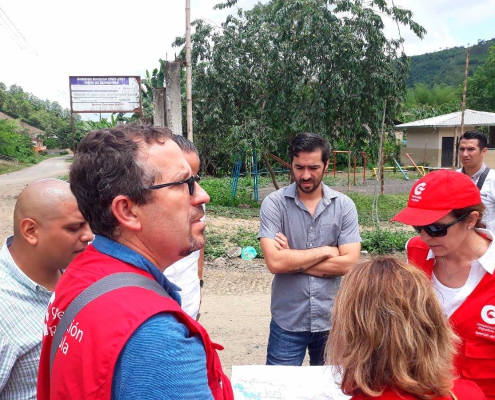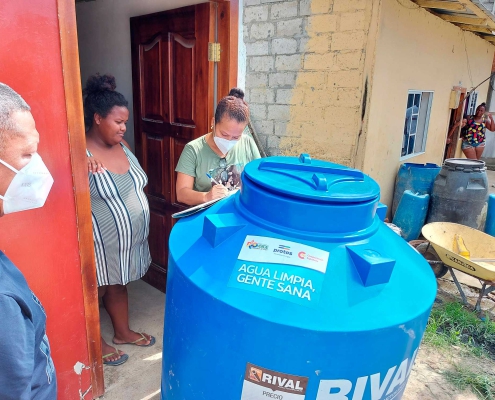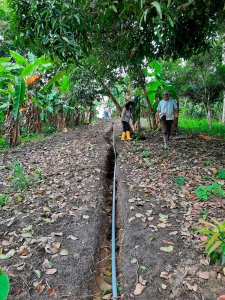ACTIVE PROGRAMS in 2021

The second bilateral programme is Drinking Water and Sanitation in Dispersed Rural Communities in the Portoviejo District (ECU-051-B), which received a donation of 2.3 million euros from the Water Fund. The intervention began implementation in 2020 and throughout 2021 various community development initiatives were launched, including the creation of Agrupación Hermanas de Tierra (Sisters of the Earth), an association made up of women from the 16 dispersed rural communities that are benefiting from the programme, who have received training and empowerment through the programme’s own training school. Socialisation and awareness-raising projects have also been carried out, such as ‘La Historia de mi Fuente’ (The Story of my Fountain) campaign, an initiative implemented for International Water Day to build the stories of the water source in selected communities. In addition, seven drinking water and sanitation systems are planned, which will benefit 2,061 people.
This programme is a good example of the Fund’s main lines of work, since its objective is to achieve the effective fulfilment of human rights to water and sanitation among the population of rural communities who, without the intervention of the Fund, will not be able to benefit from the systems to be built under the overall programme.
This overall programme is the Water and Sewage Programme for Portoviejo, (also known as the “base project”) in which FONPRODE, the European Investment Bank (EIB) and the Inter-American Development Bank (IADB) are participating, mobilising a total of 115 million euros. The extensive programme also includes 10 million euros of funds from the EU’s LAIF initiative, managed by the AECID as delegated cooperation. The objective of LAIF is to strengthen actions through technical assistance and housing improvements, as well as to complete access to water and sanitation for the dispersed rural population.
In this sense, through the LAIF programme, progress has been made in the area of institutional strengthening, working in conjunction with the Portoaguas company. In this line, a twinning agreement has been established with EMASESA, the Metropolitan Public Water Supply and Sanitation Company of Seville, to facilitate the exchange of knowledge and learning between the two companies. Likewise, in November 2021, EMASESA technicians travelled to Portoviejo with the aim of carrying out a diagnosis of the Ecuadorian company’s strengthening needs.
Portoviejo’s “base project” foresees the implementation of a 47-kilometre drinking water and sewage system along the Chico River; a project to serve scattered rural areas that cannot collect water from the river or connect to the sewage system; and the strengthening of the Portoviejo Municipal Public Company for Drinking Water and Sanitation (Portoaguas). Among other actions, a treatment plant will be built in Cuatro Esquinas.
Lastly, the most recent programme is Drinking Water and Sanitation in Rural Communities in the San Lorenzo District in Response to the COVID-19 Health Crisis, ECU-052-B, which is still in the preparation phase and will be complementary to the delegated cooperation programme Northern Border: Territory of Development and Peace, which operates in the area of Esmeraldas, on the Colombian border. It is one of the provinces with the highest poverty rates in Ecuador and was one of the most affected by the 2016 earthquake, which hit the province of Manabí hard. The programme will fund the improvement of rural water and sanitation services as well as the city’s urban network and strengthen municipal water management and response capacity to health emergencies such as COVID-19, benefiting around 3,400 people, mostly Afro-descendants and indigenous people. Implementation is expected to begin in the first quarter of 2022.
OTHER PROGRAMMES ASSOCIATED WITH THE FUND

Complementary to the FCAS initiatives, a programme was launched in 2020, with European Union funding, to support public drinking water and sanitation services in the Montubio, indigenous and Afro-Ecuadorian populations in the provinces of Manabí and Esmeraldas in the context of the health emergency caused by the COVID-19 pandemic.
This project is worth more than 200,000 euros and is funded by the LAIF Regional Delegated Cooperation Programme [see Section 4.1. of this report] and implemented by the specialised NGO PROTOS.
The programme was completed in November 2021, directly benefiting 30,675 people thanks to the implementation of small interventions (improvement of the sanitary conditions of wells; replacement of piping networks; installation of sanitation tanks…) and the implementation of institutional and social foundations to ensure adequate planning and resource allocation processes in rural water and sanitation services.
COUNTRY CONTEXT

The Ecuador-Spain Country Partnership Framework establishes four specific areas of work: sustainable economic development, innovation and research, gender and social inclusion, and habitat.
The latter includes improving access to water and sanitation services, as only 66% of the population has access to safe water and 41% to safe sanitation services.
The Water Fund has implemented a total of four interventions in the country, with a total grant of 28.5 million euros, in addition to LAIF-funded programmes and global interventions involving various international institutions.

